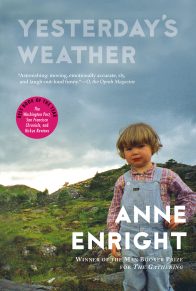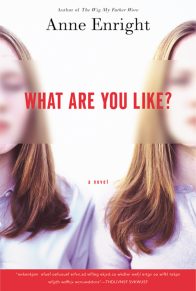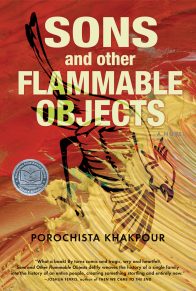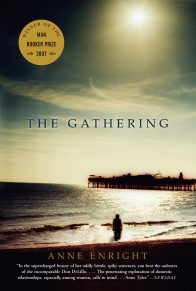By that time I needed anything I could get, apart from money, sex and power which were easy but hurt a lot. The angel rang at my door with an ordinary face on him and asked for a cup of tea, as was his right. He revealed himself on the threshold with broad comments about my fertility. Who needs it? I felt like taking the cup right out of his hand.
We wrestled for a while, which was just part of the job as far as he was concerned. I thought he had been wafting about since Aye began, in that place where grief and joy are one, where knowledge is an old joke and Time is just another window. I thought he might do a lot of singing. I was wrong. The angels he knew were ordinary men who killed themselves once when times were bad. Now they had to walk everywhere, setting despair to rights, growing their wings.
I said I was glad that this was the way it turned out, that I thought everyone was too hard on suicides.
It isn’t as if, I said, you did it just for fun. He said being an angel wasn’t a free ride either. There was a lot of wrestling involved, a lot of regret. He wished, for example, that I would stop looking where his crotch kind of glittered while the rest of him glowed. He asked me how the despair was coming along. I smiled. I told him he was wasting his time on me.
Stephen had been gaffer for a construction company in Canada with some accounting duties and responsibility for a lot of materials and transport. He built a bridge in Regina and went on from there. Getting married was one of those surprises, he said, when you’re just a kid yourself, but his daughters were the saving of him (they taught him how to read), and the bridges were great. Then there was all that clear sky and the crisp winters when your hand might freeze to the girders and you couldn’t feel a spanner except as a burn. He was in Ontario in 1934 with a job nearly done, each side of the span cantilevered out over the water and gaping. One night he walked up to where the road stopped and stepped over to the other side. Actually, the noose froze. It was the cold that did for him in the end.
That was it, he said, and nothing left, apart from a lingering pain for humanity and a susceptibility to the weather. He gave me a smile of celestial beauty which spread over most of him, but missed the marks on his neck.
“So what’s it like since God died?” I asked with a laugh. He looked at me.
“And how’s your mother?” he said. Which I thought was a little low, since she is fairly happy now, considering. Besides, there are things between every mother and child best forgotten, when we all settle^ down and just get on with it.
Apparently this was just a stock question and second on the list. His own mother had doubled up with grief one day while clearing the dishes. She looked like she was trying to push her head into the teapot, because she had to press her face against something and she could not cry.
I was disappointed with all this mother-and-teapot lark. She was not the last thing he had thought of, before he died. I told him to get on with it and he went through the list.
The List
Did my mother weep, did my father die, did the two happen around the same time and which one caused the other.
Did I leave lightbulbs burning alone, did I draw the curtains at night, did I ever put a plug in a socket just to make it feel happy.
Had I ever pissed myself in public, did I take pleasure in it. Did I suffer from the feeling that I had left something behind in a train. Is that why I smoked, so I could check my pockets for cigarettes.
Had I ever been overheard in a private conversation. Had I ever put blood on a mirror. During the sexual act did I suffer from regret.
Did beauty disgust me.
Did Jesus Christ die for me.
Did I ever hoard parts of another person’s body, for example a lock of hair.
Had I ever seen a pregnant woman swimming on her back.
I found my sexual feelings for Stephen quite disturbing. He had taken the precaution of sleeping with me at night. We were both looking for the question that was missing off the list and we needed all the time we could get.
Besides, there were problems at work. I thought about him as he lay beside me, not making a dent. Just my luck I said, cold hands and a rope burn, but he whispered in his sleep until even the sheets looked happy.
And then there was always his ineffable smile of incredible beauty. There was also the fact that he was blessed, that all the blessings ever given or withheld seemed to sit in him, for example the blessing my mother never gave me and the one I never gave her, despite the fact that we are both superstitious that way.
There was also awe and awfulness, always a good one between the sheets. Not to mention the unutterable, the unspeakable and the inexpressible, lying by my side in hand’s reach.
“You’re forgetting about purity, wisdom and grace,” he said. “Even a human can have them.”
“No I’m not,” I said and made a pass at him saying “This is pure, isn’t it? This is wise?” and a lot of other very embarrassing things, as one does in these situations.
He said he thought that nymphomania was out of fashion now, but where he came from it caused a lot of parental concern. Various procedures might be followed, with or without the aid of anaesthetic, he said, and the mildest cure of all was a bag of powdered camphor hung around the woman’s neck. So he got out of the bed to look for mothballs.
We were no nearer the question as he hovered six feet over the bed and cried all night.
By breakfast time I knew what I wanted to say. I wanted to say “It’s not as if you don’t think about it too, you bastard, about warming your cold hands in my hot crotch, not to mention the last thing you did, before you died.”
“I cast my bread upon the waters,” he said.
My mother rang to tell me that I wasn’t at work.
“You’re not at work,” she said. “Are you all right?”
“It’s Saturday,” I said. “How are you?”
“I’m fine,” she said, because we both lie the same way. “Any news?”
“Nothing much,” I said (there is an angel in the kitchen, breaking the toaster), “and yourself?”
“Oh nothing new here.” (Your father is dying, but so are we all.) So we hung up.
Stephen watched the television. He sat on the sofa and laughed. When the weather forecast came on he looked at the satellite picture, said “Wrong again! Ha ha ha.” He told me about an angel of his acquaintance who had killed himself three different ways at once. His death, when it came, was so violent, that he was still scattering and now, instead of walking, he fell like the rain.
And then there was the guy, he said, who died to the sound of sex in the next room, which was, he thought, quite a nice way to go.
“He specialises in the sound of kisses and their colour.”
“Really,” I said thinking about red.
We sat there all day, fighting over the remote control, waiting to see which one of us would snap. He cried at the news, or laughed inappropriately. I did the same at Little House On the Prairie. He annoyed me by pointing out an actor in the crowd.
“I know him. Cyanide. 1964. Lovely guy. Specialises in the mothers of homosexual men and shoes.”
Then there was the show I was working on. It was called the LoveQuiz. I said “Have you ever seen anything so awful in all your life?” and Stephen said “It’s about Love, isn’t it?”
So I went into work and made people love each other for a while.
The next weekend I took him into town. I was hoping he would bump into someone more needy and snag on to their grief in the crowd.
I had to hold his arm walking down the street to get him through all the pain between the GPO and O’Connell Bridge. He knelt down outside Clery’s and took some dirt up off the street like a child. So I brought him inside, down to the hardware department and explained toasters to him, just to make the effort. I could tell by his enthusiasm that he missed the passage of time, he missed his body, more than he missed the body of his wife.
By the time we got to the river I loved him. He sang the Canadian Boat Song for me. The rain didn’t wet him and the wind blew right through.
We looked down into the water and I said that maybe we could make a go of it after all. I would give up money if he liked, and lust, if he had to be old-fashioned. I said that there was something between us that was real and strange and just because he denied it, didn’t mean that it wasn’t there. The end of his nose went white. He said to me “If dying wasn’t enough, how do you think that sex would help?”
“You’re just like the last man I went out with,” I said. “At least he put out.”
He began to sing.
He was still singing when my mother called to the house with some food in a Tupperware box. They seemed to get on fine.
“No-one sang like that for me,” she said.
“If you want him, you can have him,” I said.
“Thanks for the chicken,” she said. “It’s nice to see you still care.”
“Don’t be so bloody sarcastic,” I said and left them both in the kitchen, talking about God.
I went into the sitting room and turned on the television to cover the sound of their voices. For a shy woman, my mother is remarkably loud. She said “I feel sorry for young women these days, so much is denied them.” She said “It is a pity that she can’t sing. I always thought that a singing voice was the best gift of all. Never mind all the rest.” I turned up the television and started banging my head off the wall.
“You know what I think,” she said as I showed her out, “about you and men?”
“Yes,” I said. “Now fuck off Ma and leave me alone.”
Stephen came into the hall. She turned to him. “Where did I go wrong?” she said. “The summer I was pregnant with this young woman, I swam in the sea every day, in the sun and in the rain. And I said to God that this would be my prayer for the child—whoever it was, whoever it turned out to be. And now,” she said, “now look at her.”
That night I kicked Stephen out of the bed. When I got up to go to the toilet I found him naked, hanged by the neck in the shower. He said it helped him to think, but his small wings were a bit forlorn. By morning he was cheerful again. He announced that he had half an answer at least. It was not his place, he said, to care.
I rang my mother and told her we were not to blame.













